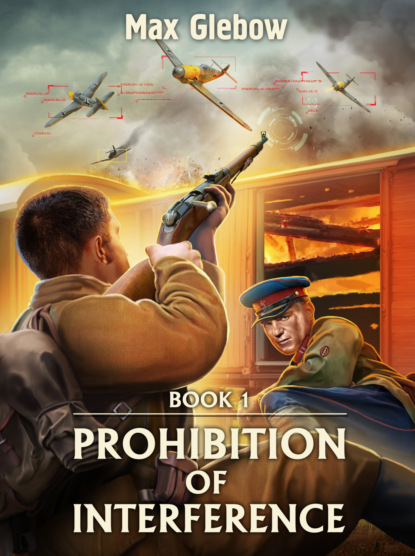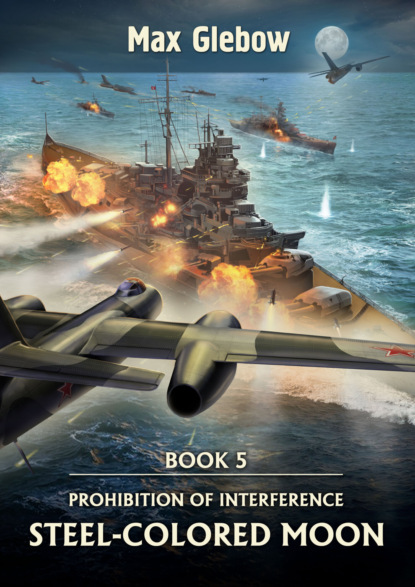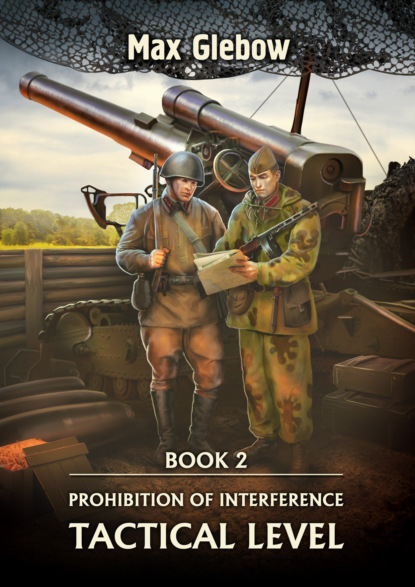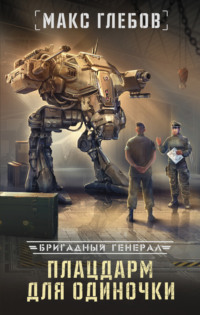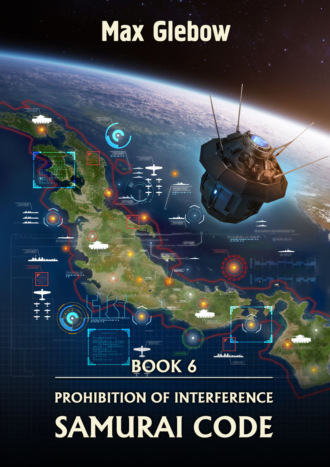
Полная версия
Prohibition of Interference. Book 6. Samurai Code
In fact, Hirch was indifferent to the fact that his decision would greatly delay the mission. Completing the task and entering the "real world" became for him an increasingly abstract goal that existed only somewhere on the fringes of consciousness. Subconsciously, he did not want to leave "virtuality" and wished that he had never had to do so. Mental illness was too deeply rooted in his brain, having long ago passed into an irreversible stage.
“Local drones are activated.”
“That's better,” Hirch nodded. “Lieutenant Crate, you're in charge on the bridge. If there's any news, I'm in my quarters.”
Twelve million kilometers from Earth, the cargo bay hatch opened in the hull of the automatic reconnaissance ship, and nine small cylindrical vehicles floated out one by one. Turning on their weak engines, which left almost no emission trace, they began a leisurely acceleration toward the third planet of the system. Minidrons covered by camouflage fields could remain undetected for a very long time and were able to sneak up close to reconnaissance targets. Lieutenant Commander Hirch was not going to take any chances and preferred to trade time for information.
* * *“Drones are in orbit, Lieutenant Commander, Sir,” the reconnaisance drones operator reported. “Now we have more information.”
“Report.”
“There is a constellation of scientific satellites orbiting the third planet. They have good camouflage fields, so the drones probably didn't pick up everyone, but some satellites are damaged and therefore easier to detect. Apparently, this is a consequence of the arrival of the cruiser Admiral Kuhn in the system. It probably just didn't have time to destroy the entire network, or it was distracted by another enemy.”
“Do the satellites have weapons?”
“The drones were unable to penetrate the camouflage fields of the active satellites, but judging by the wreckage of the destroyed satellites, they are unarmed. Apparently, the base on the natural satellite was designed to study the civilization inhabiting the planet. The drone managed to download some information from one of the almost dead satellites. It couldn't access the shared network, but it broke into the local data storage, and now we know a lot about about what was happening on the planet before Admiral Kuhn arrived here.”
“It can wait,” Hirch brushed him off. “What is known about the base itself?”
“All exterior structures are destroyed. There is no sign of the camouflage field generators, but scanners have not been able to penetrate deep below the surface. The lower levels of the base could have survived, with a fairly high probability of doing so.”
“Could anti-space defense assets have been preserved there?”
“They could, especially if they were located at some distance from the base itself and were used only at the very end of the battle. It is possible that hangars with fighters or in-system transport ships have also survived.”
“Is the enemy showing any activity?”
“There is no absolute certainty, but drones are picking up signs of short-range communication systems. The orbital constellation seems to be exchanging data with someone on the planet's surface and with the base on the natural satellite.”
“What's going on down there?”
“There's a big war going on over there, Commander,” replied the ship's deputy commander for armament, “The Aborigines enthusiastically destroy each other, using primitive technology that is two hundred years, maybe two hundred and fifty years, behind ours. The only problem is that there are a lot of these wild people out there. The resources of the Consul Pran are not enough to destroy them all. Besides, it's not certain that we'll be allowed to do it in peace. Going to the planet with an incomprehensible object on the satellite behind us…”
“Don't take me for an idiot, Korff,” Hirch grimaced. “Forward me all the data delivered by the intelligence. War on the planet is good for us. If we can't kill the natives on our own without undue risk, why not help them do our job for us? I think covert support for the losing side would be a good solution. Senior Analyst, in eight hours I want to see a preliminary computer analysis of the main scenarios of our intervention in the course of combat operations on the planet. The goal is to expand the scope and intensity of the conflict as much as possible. There must be no winners in this war.”
Chapter 2
Vice Admiral Gun'ichi Mikawa stared intently into the night sea. Today his luck had smiled on him. In the difficult battle just ended, his squadron defeated U.S. and Australian allied forces covering the landing of the American troops on the island of Guadalcanal.
The Solomon Islands were one of the most important points in the Pacific Ocean. With the airfield already nearly completed on this strategically important island, Japanese aviation would be able to control considerable water space and operate on convoy routes connecting the United States, Australia and New Zealand.
The Americans also understood the importance of Guadalcanal and were not going to let the Japanese gain a foothold on the island and build an air base there. The Allied amphibious landing began on August 7, and attempts to prevent it with air strikes had only limited success. As darkness fell, however, the Imperial Navy entered the fray.
Allied ships covering the landing fell into the trap set by Mikawa off Savo Island. Their four heavy cruisers went down. Another cruiser and two destroyers sustained serious damage, while not a single ship in the Imperial Navy even lost combat effectiveness[1]. It was an undoubted victory, but it was no less important to make the next decision. It was now, after the destruction of the cover ships, that the way to the American landing zone was open, Mikawa's cruisers could reach the defenseless American transports unloading equipment and ammunition on the island shore. However, somewhere in the darkness of night the American aircraft carriers were hiding, and if morning caught the Japanese ships in range of their planes, this victory could turn into a catastrophe.
It was a difficult decision. Vice Admiral Mikawa understood that his ships would need time to regroup, eliminate the effects of enemy shells and to reload torpedo tubes, which was a laborious and time-consuming procedure. The Japanese ships had few shells left, and there was no air cover. The few seaplanes based on the cruisers don't count – they're just scouts. A brief meeting with members of the staff only confirmed Mikawa's near decision not to risk the squadron, and at two hours and twenty minutes he ordered his ships to begin withdrawal.
Suppressing a heavy sigh, the Vice Admiral temporarily turned over command of the squadron to the commander of the cruiser Chōkai and headed for his quarters. The victory warmed his soul, but the decision made did not give the squadron commander peace of mind and brought unpleasant thoughts.
The first months of the war brought a number of resounding victories for the Land of the Rising Sun. After the tremendous success in attacking the U.S. fleet at Pearl Harbor, the destruction of two British battleships in the South China Sea, the capture of Burma, Malaysia and the Philippines, the successful landing of General Yamashita's army at Singapore followed, as did the landing at Bali and the capture of the islands of Sumatra and Timor.
In the battle in the Java Sea, Rear Admiral Takagi's squadron sank five enemy cruisers and five destroyers, almost completely destroying the Anglo-American squadron that was trying to prevent the Japanese from taking over Java Island. As early as the eighth of March the garrison of Java surrendered and thereafter the entire Dutch East Indies were seized by Japanese troops almost without resistance. Then, in March, they occupied the Andaman Islands.
Japanese-controlled territory moved close to the shores of Australia. On the nineteenth of February their aircraft bombed Darwin, and on the third of May the island of Tulagi was occupied without a fight, and a major battle for New Guinea and the Solomon Islands unfolded.
Nevertheless, the first failures appeared in the victorious expansion of the Empire of Japan. On May 3 a battle took place off the coast of Australia in the Coral Sea in which the Japanese failed to achieve a decisive victory, and in early June the Imperial Navy lost four aircraft carriers in a battle off Midway Atoll, which was a real disaster. Naval aviation suffered irreparable losses, losing its most experienced and trained pilots.
And now the Americans and their allies became so bold that they decided to launch a counteroffensive by landing on Guadalcanal Island. And he, Vice Admiral Gunichi Mikawa, had a real opportunity to disrupt this enemy operation, but he limited himself to winning the sea battle, and, with his tail between his legs, turned his ships around, afraid of aircraft attacks from American aircraft carriers.
To distract himself, Mikawa sat down in a chair at his desk and turned on the radio, trying to tune in to the Tokyo radio wave. Soon he heard the familiar callsigns of "Kyokai Hoso" of the NHK Japan Broadcasting Corporation. Through the usual rustle of interference the announcer was talking about the weather, and the Vice Admiral grimaced, realizing that in the next few minutes he would not hear anything important. At that moment, Mikawa didn't yet know how badly he was wrong.
The slight crackling of the air suddenly turned into an unpleasant screech, which was almost immediately replaced by an unfamiliar silence, and then it was cut through by a distinct and somewhat lifeless voice, speaking Japanese clearly, but with a strange, unnatural accent.
“Vice Admiral Mikawa, if you would be so kind as to give me a few minutes of your time…”
Mikawa twitched with his whole body, staring at the radio receiver like it was a poisonous snake.
“Don't worry, Vice Admiral. Unfortunately, our communication is one-way, so just listen to me. If you want details about who I am, I will explain, but not now, because it is not so important at the moment.
What is important is that the enemy aircraft carriers that you feared when you decided to abort the operation had, the night before, withdrawn from Guadalcanal and have left the Solomon Islands area. Yesterday your aircraft attacking the U.S. landing zone inflicted serious casualties on their deck fighters, and Admiral Fletcher decided that if your planes from Rabaul base attacked his ships, the deck aircraft would not be able to repel them effectively. As a result, he gave the order to withdraw the aircraft carriers from the possible strike zone. I understand that you have no reason to believe me, but you have seaplanes, and you can at least partially verify my words, and so that you do not doubt, I will first give you the exact coordinates of the point where the American destroyer is drifting, which has become dead in the water as a result of damage, and also indicate the anchorage of the unloading transport ships. The decision is yours, Vice Admiral, but if I were you, I wouldn't pass up the chance. One more thing. The situation, as you can imagine, is constantly changing, and if you want to keep up with these changes, don't forget to turn on your radio regularly.”
* * *On August 7, the weather was inclement, and Japanese patrol planes were unable to fly a reconnaissance flight over the waters of the Solomon Islands, which played a key role in the initial phase of the battle. Guadalcanal and several smaller islands nearby were the target of the U.S. landing party. If the slow transport ships had been detected on approach to the landing point, the chances of the landing party reaching the islands would have been reduced to a minimum. However, it happened as it happened, and eleven thousand Marines under Brigadier General Alexander Vandergrift landed almost unhindered. Their main objective was to take over the unfinished airfield at Cape Lunga.
Japanese units, taken by surprise, came under fire from the ship's guns and bombing strikes by aircraft from U.S. aircraft carriers. Panicked, they offered little resistance and the next day, after an arduous march through the tropical jungle, Vandergrift’s paratroopers took control of the airfield. The Japanese withdrew in disarray, abandoning construction equipment, vehicles and food supplies.
The General was pleased with the start of the operation. He accomplished the task with minimal casualties, something he had not expected at all. Nevertheless, the situation in which the Marines found themselves could not be called simple. The enemy quickly recovered, and numerous Japanese aircraft appeared in the sky, but the real problems began on the night of August 9.
The lightnings of gun salvos blazed into the sea, and the rumble of distant explosions rolled on shore. The Imperial Navy was unwilling to tolerate the Allied landing on Guadalcanal. Vandergrift could only guess at the course of the naval battle, but all his previous experience told him to prepare for the worst-case scenario.
The transport ships were still unloading, and the landing site had to be covered from land. At the same time, the perimeter around the seized airfield had to be reinforced as much as possible. Vandergrift had to stretch his forces, and this caused him serious anxiety. Heavy weapons were still in the holds of the transport ships or, at best, just now being unloaded on the beaches, and a Japanese attack could follow at any moment. By midnight the roar of the guns had died down for a while, and there was a tense silence that could have meant anything.
An hour later a confused message came from the fleet, which indicated that the squadron covering the landing party suffered heavy losses, but the Japanese ships did not continue the attack and, having made a turn, went to the northeast, rounding the island of Savo.
“Speed up the unloading as much as possible,” Vandergrift muttered through his teeth as he read the radiogram. He was well aware of the value of such statements by sailors and knew how to put two and two together. The General was well aware that even if the aircraft carriers that had recently departed the Solomon Islands tried to return, they would not be able to stop Japanese heavy cruisers at night. Of course, the report of the departure of the Japanese squadron could be true, and then they could consider themselves very lucky, but for some reason the General did not believe it, and the next few hours confirmed that his pessimism had more than good reason.
First there was a short fight somewhere not too far out to sea. Several volleys of heavy guns were heard, followed by a powerful explosion that brightly illuminated the horizon for a few seconds. About twenty minutes after it was quiet, the engines of Japanese seaplanes sounded in the sky, and flare bombs flashed over the beaches and the anchored transport ships, turning the landing site, which looked like a bustling anthill, into a perfect target.
A scattering of bright flashes appeared in the relative silence near the horizon. There was no need to explain to Vandergrift what it was.
“Everybody take cover!”
There was no need for this command. His soldiers and sailors from the transport ships knew very well what the night volley of a squadron of heavy cruisers looked like. Twenty seconds of tense waiting and the landing zone turned into a sea of fire. The transport ships were the first to be hit. They each carried a 102 millimeter cannon to defend against submarines that had surfaced above the water, but their occasional shots could do nothing to change the picture of the merciless beating of the landing force.
Howitzers, tanks, and, most importantly, shells for the most part were still unloaded, and the transports, which had no armor, exploded from the first or second shell hit; the Japanese gunners knew how to shoot, and in literally ten minutes the American ships were finished. Vice Admiral Mikawa's squadron, which had come closer to shore, shifted the fire to the beach, and turned the unloaded equipment and the paratroopers' property into piles of burning rubble.
There was nothing more to do here, and Vandergrift ordered his men to withdraw to the captured airfield. However, the Japanese squadron did not limit itself to destroying transports and bombarding the landing site. Its commander was well aware of the aim of the landing, and in a few minutes the cruisers' guns shifted their fire to the positions of the Marines at Cape Lunga. The Japanese were careful not to shell the unfinished runway itself – they obviously hoped to use it in the future, but the whole area around the airfield was hit by heavy shells. Seaplanes circled over the Marines' heads, periodically dropping flare bombs and correcting their ships' fire.
Taking cover in a shallow trench, Vandergrift clenched his fists to the point of pain. In his imagination, he could clearly see that a few kilometers from the airfield Japanese soldiers, encouraged by the actions of their fleet, were preparing for a night attack. An attack that he would have nothing to repel with.
* * *“Irs, they're not fugitives,” Letra's voice sounded worried and… indignant. “In the cargo compartment they had not medical capsules, but minidrons for in-system reconnaissance. Lieutenant, forty hours ago they hacked into our satellite!”
“Did the network defense hold? And why are you only telling me this now?”
“It was a damaged satellite that had no direct access to the network, but it still had a lot of information in its storage devices. The good news is that all this information belongs to the period before the attack on the Moonbase, which means that the rebels know nothing about your actions on the planet. After being damaged by rocket shrapnel, the satellite went into a passive mode, waiting for the arrival of a repair drone, which, as you understand, never arrived. We don't have a military network, as you remember. The security protocols are completely different. The machine was not online and was monitored sporadically. Another test revealed the fact of a third-party connection. You know the rest.”
“Why aren't they attacking?”
“They fear a stab in the back from our base. Put yourself in their shoes. The wreckage of the cruiser that tried to destroy the base in a frontal attack is dangling in lunar orbit, and all they have appears to be a destroyer, and it's not the fact that it is fully combat-ready.”
“I like this less and less by the minute. Apart from assumptions, we have nothing.”
“It's not all bad news, Lieutenant. Satellites have detected activity in orbit. Eight hours ago, someone was using short-range communications systems around the Solomon Islands, making a transmission over a narrow radio beam, just as I do, simulating local radio communications.
It was not possible to intercept the message, but it is clear what happened. Immediately after that, Japanese Admiral Mikawa abruptly changed his plans and turned his squadron, which was already leaving the combat area, in the opposite direction. As a result, the tactical defeat of the Allied fleet turned into a real disaster. They lost all their transport ships off the coast of Guadalcanal. The Marines who managed to disembark suffered heavy casualties, having been knocked out of the unfinished airfield at Cape Lunga by the Japanese and were now driven into the rainforest with no heavy weapons and almost no ammunition. Irs, there can be no other option here than for the rebels to intervene in the war on Japan's side. So far their actions are limited to the transmission of information, but you know as well as I do that it can be a very effective weapon.”
“How many drones do they have? Can they build a network of satellites like ours over the planet?”
“I don't think so. The destroyer is a warship, and reconnaissance is only an auxiliary function for it, and the drones themselves are not designed for such tasks, so we were able to detect the fact of the transmission from orbit, even though we weren't able to intercept or jam it.”
“And now what? That way, the Japanese can find out about all my actions at any time.”
“Lieutenant, do you really think the rebels will limit themselves to leaking information to the Japanese?” There was a sound of incomprehension in Letra's voice. “I have to disappoint you. A few minutes ago a similar transmission from orbit was noted in the vicinity of Berlin. Forget everything that came before. I'm afraid the game you started a year ago has gone to an absolutely other level.”
Chapter 3
After the new force intervened in the course of events, the situation on the fronts became completely unpredictable. Neither I nor Letra could foresee where and how the rebels would influence the decisions and actions of the enemy. Nevertheless, my plan was approved by the Headquarters of the Supreme High Command and I had no opportunity to deviate from it – no one would have understood me. And since that was the case, I should have started to act, especially since the pilots and equipment had already arrived from the Union, and now Moscow and Washington were waiting with great interest for me to begin active operations against the Japanese.
The Chinese met us with great enthusiasm. Their generals still tried somehow to contain their emotions, but the middle-ranking officers made no secret of their enthusiasm for the new Soviet equipment; they believed that now that the Russian pilots had returned to their country, everything would finally change, and their army will cease to be a side that is perpetually defensive and constantly defeated.
The Chinese provided us with an airfield to base the Kudryavtsev’s regiment near the city of Chongqing, which became the temporary capital of China after the Japanese occupation of Nanjing. Chiang Kai-shek refused to place us closer to the front line. Apparently, he had no confidence in the resilience of his soldiers, which was understandable. We arrived in his country in the midst of another Japanese offensive. The enemy was advancing through Jiangxi Province toward the city of Changsha. The Chinese divisions were retreating, losing badly to the Japanese in technical equipment, mobility, and the organization of troop control.
Part of the coast of the South China Sea and East China Sea was still under the control of Chiang Kai-shek's army, but it was sandwiched between Indochina, occupied by the Japanese, to the south and Shanghai, lost back in 1937, to the north. In addition, it was torn in two by Hong Kong, which had been invaded by Japan.
The Imperial Army sought to establish a land link between the territories under its control, at the same time completely cutting off the Chinese forces from the sea, and Chiang Kai-shek naturally tried to prevent such a development by all possible means. Naturally, he immediately decided to use me to stop the enemy's advance with air strikes.
In principle, I was not at all against helping the Chinese generalissimo with his problems, but only as a side task. That was not why I came to China. I needed to organize a painful demoralizing blow to the Japanese forces that would make a proper impression on Roosevelt and Stalin, and I think I knew exactly where I was going to do it.
Fighting in the Pacific was growing in scope, and the Imperial Navy had to constantly move its ships from one region to another in order to respond to the Allies, who sought to seize the initiative. Now, as a major battle unfolded in New Guinea and the Solomon Islands, the Japanese urgently redeployed the aircraft carrier group that had taken part in the Aleutian Islands operation in July.
The heavy aircraft carrier Zuikaku, which had just been repaired at the metropolitan docks, left the Kure District shipyards and put to sea to join the rest of her battalion. On the way, the aircraft carrier made a stop in Okinawa to replenish the air group and refuel. At my direction, Letra carefully monitored the movements of all the big ships of the Imperial Navy, carefully choosing the moment when one of them would be in a vulnerable position and at the same time be in the range of my planes, that was, within a thousand kilometers from the coast of the South China Sea.
Of course, I'd like to catch some iconic battleship like the Yamato at the crossing. The destruction of the world's largest battleship would undoubtedly have impressed the leaders of the USSR and the United States, but the Imperial Navy's line forces were based on Truk Island, more than three thousand kilometers southeast of our airfield, so it could only be dreamed of. Nevertheless, Zuikaku was not a bad target either. After the battle in the Coral Sea and off Midway Atoll, it became clear to all sensible admirals of the world, that it was now the aircraft carriers that played the major role in the ocean.


